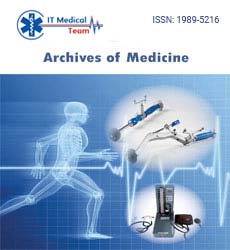Perspective - (2023) Volume 15, Issue 5
Occupation's impact on the use of Korean medication
Hong-Jin Jeon*
Department of Psychiatry, Depression Center, Sungkyunkwan University School of Medicine, Seoul, Korea
*Correspondence:
Hong-Jin Jeon, Department of Psychiatry, Depression Center, Sungkyunkwan University School of Medicine, Seoul,
Korea,
Email:
Received: 22-Aug-2023, Manuscript No. ipaom-23-14119;
Editor assigned: 24-Aug-2023, Pre QC No. P-14119;
Reviewed: 05-Sep-2023, QC No. Q-14119;
Revised: 11-Sep-2023, Manuscript No. R-14119;
Published:
19-Sep-2023
Introduction
Fundamental concentrate on its use by calling is
expected to exhibit the capability of Korean medication in
the field of word related medication. The reason for this
study was to figure out who uses Korean medication and
whether this changes by calling. Occupations in Korea have
become more particular and different because of modern
development. The Korean government fostered the Modern
Mishap Remuneration Protection in 1964 and passed
the Working environment Security and Wellbeing Act in
1982 with an end goal to lessen and pay for word related
wellbeing risks. A Korean clinical office was perceived as a
nursing organization for modern mishap pay protection in
1999 [1].
Description
In Korea, research has been progressing all through this
period and somewhere in the range of 2000 and 2010, 40
distributions on word related wellbeing were distributed
in the Korean Clinical Diary. These explicitly remembered
one paper for modern mishaps, 13 papers on word related
sicknesses, 9 papers on wellbeing related propensities and 13
papers on wellbeing assessment drives. The administration
systems and particulars of how Korean Medication will deal
with word related medication are as yet being worked out,
consequently there hasn't been greatly composed on its use
comparable to occupations. 4,000,000 bucks, or around
0.7% of the all-out modern mishap protection payouts in
2018, were the expenses of Korean medication that were
paid by protection for working environment mishaps in
2018 [2].
The Andersen model's initial form isolated the
affecting components into three classifications: inclining,
empowering and needs parts. The inclining part is
comprised of attributes that arise before clinical use, for
example, sociodemographic qualities, social construction
characteristics and mentalities about clinical therapy
(clinical individuals) and sickness. Family or individual
assets, openness, elements of the medical care framework
and a propensity or preference to utilize a specific specialist's
administrations are instances of the empowering part. The
last part of clinical prerequisites is assessed by individuals
responding and evaluating the side effects and level of
debilitation they see from the condition, or by a clinical
assessment of their wellbeing and the earnestness of their
sickness finding. As indicated by Andersen's methodology,
every one of the three factors impacts clinical use all alone.
Despite the fact that there are other clinical use models,
the Andersen model was picked as the hypothetical model for this examination. To start with, albeit the Becker
and Sucman models recognize individual insight as the
essential driver of clinical use conduct, it is trying to find
information on private discernment factors like religion
and convictions.
Along with the Korea Organization for Wellbeing
and Parties (KIHASA) and the Korean Public Medical
coverage Administration, the Korea Wellbeing Board
assembles information. The main information that can
recognize clinical expenses and auxiliary information by
utilizing delegate tests of Koreans is the Korean Clinical
Board information, consequently we utilized that. The
health care coverage guarantee information from Korea
may likewise be utilized to recognize Korean doctor's visit
expenses, but it is trying to decide each subject's work and
how to utilize non-benefits [3,4]. 90% of the data from
the 2005 Populace and Lodging Registration was utilized
to test the Korean Clinical Board. The testing method is a
subsequent stage delineated bunch examining approach in
likelihood extent, with separation factors comprising of 16
significant urban communities and towns the nation over.
Along these lines, the Korean Clinical Board's example
information is illustrative of the entire Korean populace.
The Korean Clinical Board at last contained 6437 families
and 17,424 people in 2016 attributable to fatalities and
a refusal to do an examination, down from 7009 families
and 21,283 individuals when it initially started in 2008.
The Korea Wellbeing Board Information from 2008-
2016, Form 1.5, were used in this examination. Albeit the
crisis, hospitalization and short term classes of the Korea Wellbeing Board's clinical use information are isolated,
the short term clinical use information were analyzed in
the best profundity since the crisis and hospitalization
information were lacking. Information from the latest year
(2016), which was used in this cross-sectional examination,
was utilized [5].
This study utilized mysterious, freely accessible
information from the Korea Wellbeing Board. KIHASA
gave the information and allowed consent for their use and
examination.
Conclusion
As indicated by the review's discoveries, different
work levels have various probabilities of using Korean
medication and bringing about clinical expenses. It is hazy,
by and by, on the off chance that this result is connected
with the way that every work has a differed geographic
openness and accessibility. To additionally comprehend
how Korean medication is applied and utilized in word
related medication, more exploration regarding the matter
is required.
Acknowledgement
None.
Conflict of Interest
None.
References
- Bezabeh SA. Africa's unholy migrants: Mobility and migrant morality in the age of borders. Afr Aff. 2017;116(462):1-7.
Google Scholar, Crossref, Indexed at
- Burns R, Wark G. Where’s the database in digital ethnography? Exploring database ethnography for open data research. Qual Health Res. 2020;20(5):598-616.
Google Scholar, Crossref, Indexed at
- Fox NJ. Health sociology from post-structuralism to the new materialisms. Health. 2016;20(1):62-74.
Google Scholar, Crossref, Indexed at
- French M, Monahan T. Dis-ease surveillance: How might surveillance studies address COVID-19?. Surveill Soc. 2020;18(1):1-1.
Google Scholar, Crossref, Indexed at
- Graham S. Spaces of surveillant simulation: New technologies, digital representations and material geographies. Environ Plan D Environ Plann D. 1998;16(4):483-504.
Google Scholar, Crossref, Indexed at






